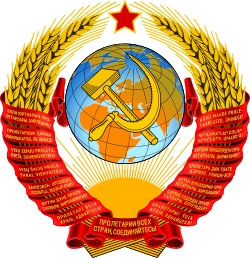Autonomous Soviet Socialist Republics of the Soviet Union
An Autonomous Soviet Socialist Republic (ASSR) of the Soviet Union (Russian: автономная советская социалистическая республика, АССР) was a type of administrative unit in the Soviet Union created for certain nations. The ASSRs had a status lower than the union republics of the Soviet Union, but higher than the autonomous oblasts and the autonomous okrugs.
In the Russian SFSR, for example, Chairmen of the Government of the ASSRs were officially members of the Government of the RSFSR. Unlike the union republics, the autonomous republics did not have a right to disaffiliate themselves from the Union. The level of political, administrative and cultural autonomy they enjoyed varied with time—it was most substantial in the 1920s (Korenizatsiya), the 1950s after the death of Joseph Stalin, and in the Leonid Brezhnev era.[1]
Azerbaijan SSR
Georgian SSR
- Abkhaz ASSR, now Abkhazia
- Adjar ASSR, now Adjara
Russian SFSR
The 1978 Constitution of the RSFSR recognized sixteen autonomous republics within the RSFSR. Their current status (as of October 2007) within the Russian Federation is given in parentheses:
- Bashkir ASSR (now Republic of Bashkortostan)
- Buryat ASSR (now Republic of Buryatia)
- Chechen–Ingush ASSR (now Chechen Republic and Republic of Ingushetia)
- Chuvash ASSR (now Chuvash Republic)
- Dagestan ASSR (now Republic of Dagestan)
- Kabardino-Balkar ASSR (now Kabardino-Balkar Republic)
- Kalmyk ASSR (now Republic of Kalmykia)
- Karelian ASSR (now Republic of Karelia)
- Komi ASSR (now Komi Republic)
- Mari ASSR (now Mari El Republic)
- Mordovian ASSR (now Republic of Mordovia)
- North Ossetian ASSR (now Republic of North Ossetia–Alania)
- Tatar ASSR (now Republic of Tatarstan)
- Tuvan ASSR (now Tuva Republic)
- Udmurt ASSR (now Udmurt Republic)
- Yakut ASSR (now Sakha (Yakutia) Republic)
Gorno-Altai Autonomous Oblast (now Altai Republic), Adyghe Autonomous Oblast (now Republic of Adygea), and Khakassian Autonomous Oblast (now Republic of Khakassia) were all promoted in status to that of an ASSR in 1991, in the last year of the Soviet Union. Only the Jewish Autonomous Oblast retained its autonomous oblast status in Russia.
Other autonomous republics also existed within RSFSR at earlier points of the Soviet history:
- Crimean ASSR (October 18, 1921 – June 30, 1945; now the Republic of Crimea, territory disputed between Ukraine and the Russian Federation)
- Kazak ASSR (1925–1936, now the independent state of Kazakhstan)
- Kirghiz ASSR (1920–1925, became Kazak ASSR, now the independent state of Kazakhstan)
- Kirghiz ASSR (1926–1936, became Kirghiz SSR, now the independent state of Kyrgyzstan)
- Mountain ASSR (1922–1924, broken up into several smaller Northern Caucasus Republics)
- Turkestan ASSR (1918–1924, now part of the independent states of Kazakhstan, Kyrgyzstan, Tajikistan, Turkmenistan, and Uzbekistan)
- Volga German ASSR (1918–1941)
Ukrainian SSR
- Moldavian ASSR (1924–1940). In 1940, it was separated into Moldavian SSR (now the independent state of Moldova).
- Crimean ASSR (February 12, 1991 – 1992). Crimea Oblast was promoted to the ASSR status following a referendum held on January 20, 1991 (now the Republic of Crimea, territory disputed between Ukraine and the Russian Federation)
Uzbek SSR
See also
References
- ↑ Cornell, Svante E., Autonomy and Conflict: Ethnoterritoriality and Separatism in the South Caucasus – Case in Georgia. Department of Peace and Conflict Research, Report No. 61. p. 89-90. University of Uppsala, ISBN 91-506-1600-5.
